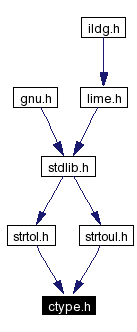
#include <nlibc.h>
Include dependency graph for ctype.h:

This graph shows which files directly or indirectly include this file:

Go to the source code of this file.
Defines | |
| #define | isupper(c) ((c) >= 'A' && (c) <= 'Z') |
| test for an uppercase | |
| #define | islower(c) ((c)>=97 && (c)<=122) |
| test if character is lowercase letter | |
| #define | isalpha(c) (isupper((c)) || islower((c))) |
| test if character is alphabetic | |
| #define | isdigit(c) ((c)>='0' && (c)<='9') |
| test if character is digit | |
| #define | isalnum(c) ( (isalpha((c)) || isdigit((c)) ) |
| checks for an alphanumeric character | |
| #define | isblank(c) ((c)==' ' || (c)=='\t') |
| test if character ist blank | |
| #define | isprint(c) (((c)>=32 && (c)<=126) || ((c)>=161 && (c)<=254)) |
| test if character is printable | |
| #define | iscntrl(c) (!isprint(c)) |
| test if character is control character | |
| #define | isgraph(c) (isprint(c) && (c)==' ') |
| if character is printable (and not a space) | |
| #define | isspace(c) ((c)==' ' || (c)=='\f' || (c)=='\n' || (c)=='\r' || (c)=='\t' || (c)=='\v') |
| test for a white-space character | |
| #define | ispunct(c) (isprint((c)) && !isalnum((c)) && !isspace((c))) |
| test if character is neither space nor alphanumeric | |
| #define | isxdigit(c) ( isdigit(c) || (c >= 'a' && c <= 'f') || (c >= 'A' && c <= 'F') ) |
| test for a hexadecimal digit | |
Functions | |
| int | tolower (int c) |
| convert uppercase letter to lowercase | |
| int | toupper (int c) |
| convert lowercase letter to uppercase | |
Definition in file ctype.h.
|
|
checks for an alphanumeric character
|
|
|
test if character is alphabetic
|
|
|
test if character ist blank
|
|
|
test if character is control character
|
|
|
test if character is digit
|
|
|
if character is printable (and not a space)
|
|
|
test if character is lowercase letter
|
|
|
test if character is printable
|
|
|
test if character is neither space nor alphanumeric
|
|
|
test for a white-space character
|
|
|
test for an uppercase
|
|
|
test for a hexadecimal digit
|
|
|
convert uppercase letter to lowercase
|
|
|
convert lowercase letter to uppercase
|
 1.3.5
1.3.5